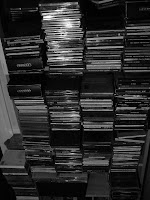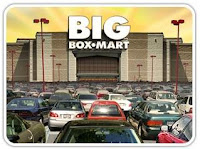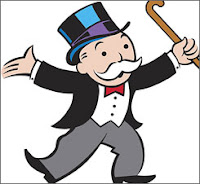 November 30, 2007 marked 20 years to the day since I started at Record Den, which has inspired some thought and reminiscing on the person I was then, what the job was like as the years went by, and what has kept me around until now ...
November 30, 2007 marked 20 years to the day since I started at Record Den, which has inspired some thought and reminiscing on the person I was then, what the job was like as the years went by, and what has kept me around until now ...OK, I realize that I left things off on a bit of a cliffhanger note in my last "Twenty Years" installment, but I figured this might be a pretty good time to discuss the long, slow, agonizing disintegration of the Record Den chain and keep you all in suspense as to What Happened Next for a little while longer. Mua ha haaaaa.
From the time of its incorporation circa 1970 until the middle of the 1980s, the success of the Record Den more or less mirrored that of the music business as a whole. While the purse strings were ultimately controlled by the company offices in downtown Cleveland, the individual stores were managed by crews of enthusiastic, knowledgeable personnel who were passionate about music and knew how to attract others of their stripe. A sizable percentage of the managers of these stores had been hired or trained by Greg at the old Great Lakes Mall location, and it was largely this group (or "cult of personality" as the main office might have viewed them) that had been the most directly responsible for the stature Record Den once attained around the Cleveland area.
By 1985, with the industry emerging confidently from the post-disco crash and riding the building wave of the CD/MTV era, the chain had been expanding beyond metro-Cleveland and into outlying areas of Ohio (Dayton, Bowling Green, Niles) and neighboring states (Indiana, Pennsylvania, Michigan). It was also around this time that the owner of the company (we'll refer to him from now on as "Deak") dropped the news to everyone that he intended to purchase a warehouse space on the east side of Cleveland and move to centralize buying operations through the main office.
The stated intent of this change in the way the chain did business was to save money, mostly by combining all of the little shipments of product moving in dribs and drabs from the distributors to each individual store into "box lot" amounts sent straight to the warehouse loading docks in order to the incur the volume discounts offered by labels to accounts who buy things by the box instead of by the handful. Problem is, the costs of distributing the product from the warehouse to all of the outlying stores (whether by company driver or UPS) tended to eradicate whatever meager amount that was saved by buying centrally. That's before we even consider the greatly-increased costs of renting the warehouse space, hiring and maintaining a staff to pull, shelve, ship and receive orders, and paying a full-time product buyer (a task once handled individually by all of the managers for no additional cost). With all of these new costs factored in the equation, the sum is, at best, a break-even proposition for a chain of maybe a dozen stores, which is exactly what Record Den was at the time.
 A stab in the general direction of thrift may have been Deak's stated intention, but there was almost certainly a matter of pride behind his new warehouse as well. While he had greatly benefited from jumping into the music business at exactly the right time and letting the people who knew what they were doing guide the direction of the company for 15 years, Deak yearned to play on the same level (and thus be awarded the same respect) as locally-based major leaguers Camelot and The Record Exchange. This new warehouse was to be our notice to the industry that we intended to swim with the big fish in the little pool, and the line to start puckering up and kissing our ass starts riiiight over here, thankyouverymuch.
A stab in the general direction of thrift may have been Deak's stated intention, but there was almost certainly a matter of pride behind his new warehouse as well. While he had greatly benefited from jumping into the music business at exactly the right time and letting the people who knew what they were doing guide the direction of the company for 15 years, Deak yearned to play on the same level (and thus be awarded the same respect) as locally-based major leaguers Camelot and The Record Exchange. This new warehouse was to be our notice to the industry that we intended to swim with the big fish in the little pool, and the line to start puckering up and kissing our ass starts riiiight over here, thankyouverymuch.From the day Deak informed him of his idea, Greg was against the plan and tried to get across to Deak the simple concept "if it ain't broke, don't fix it." But Deak's biggest flaw (and believe me, he has a few) was that he was a proud man who didn't take criticism for his own ideas very well, especially from people who worked for him. In the end, being the founder and owner of the company, it was Deak's call to make and he wasn't about to be talked out of his pipe dream but something so mundane and boring as realistic expectations. So it was that the warehouse was soon opened for business, and that decision was the start of the long downward spiral into which Record Den fell over the next decade.
The next step taken by Deak (referred to in an earlier post in the series), was the computerization of the company's inventory on a store-by-store basis. As each store was brought online, a buying program Deak had commissioned was implemented to automate the business of (re)stocking inventory. I'm not sure when this buying program was originally written or for what kind of music, but it was often set almost completely at odds with the way any sane record store would buy their product, particularly in the way it multiplied ordered copies based on sales. Let's say a new Rush album was being released this week and we ordered 100 copies right off the bat, knowing that Rush fans show up early and in force to obtain their long-awaited new album. Once that wave has hit, the game is up, and you can sell 75 copies of that new album in a week and then maybe 25 over the next year. Unfortunately, the buying program used by the warehouse didn't think that way, and unless you could short-circuit the process, you'd sell 75 copies of that Rush album in a week and then get shipped about 100 more the following Monday. With experienced managers, this program tic would be a minor irritation, but with the crop of inexperienced managers hired over the next few years following the transition, it often resulted in stores being choked with dozens of copies of hit albums they didn't need in the first place.
This buying problem gets further compounded when you then factor in returns: the major labels cut off unlimited product returns after they were nearly snowed under during the post-disco crash, and one-stops generally function on a "you can return 1 piece for every 10 you buy" rule, so if Record Den was buying too much product to return quickly, we had to kinda "swish it around" the system for a while. Attempts at controlling buying costs a few years later resulted in comical amounts of dead inventory being shunted around from new store to new store in order to fill these locations up with anything that was handy in the hopes that some of that nonreturnable merchandise would sell off before it was boxed up and sent abroad once again.
 Things were shaky enough with one buyer (an expatriate from NRM) and an outmoded restocking system, but the addition of a full-time indie buyer in 1994 might have been Deak's worst idea during my tenure with the company. I believe the reasoning here was that our main buyer was too overwhelmed dealing with the major labels to divert attention to all of the small fry doing business underneath the radar, and with these labels suddenly a hot item in the wake of breakthrough independent albums by The Offspring, Rancid, Morphine, and Liz Phair, (not to mention sundry pre-Pearl Jam/early Nirvana projects), it was decided someone should be delegated to man the pump in that area alone.
Things were shaky enough with one buyer (an expatriate from NRM) and an outmoded restocking system, but the addition of a full-time indie buyer in 1994 might have been Deak's worst idea during my tenure with the company. I believe the reasoning here was that our main buyer was too overwhelmed dealing with the major labels to divert attention to all of the small fry doing business underneath the radar, and with these labels suddenly a hot item in the wake of breakthrough independent albums by The Offspring, Rancid, Morphine, and Liz Phair, (not to mention sundry pre-Pearl Jam/early Nirvana projects), it was decided someone should be delegated to man the pump in that area alone.To virtually no-one's surprise, the woman Deak selected for this task was in way over her head and had absolutely no idea what in the hell she was doing, and within months we were becoming bogged down in no-name garage-rock, techno, low-fi pop and punk records that did little but collect dust. Six months to a year later, the stores cleared these records out from their inventory to make room for newer product and all of these unsold independently-distributed titles wound up back in the warehouse from whence they came. A year or so after the indie boom came the inevitable shake-out, and while some of the more popular minor labels quietly consolidated back-door deals with the majors, a bunch of operations simply went out of business and disappeared into the night, sticking us with skids of unsaleable (and, more importantly, nonreturnable) CDs that damn near capsized the company.
If there is one thing Greg and Deak have in common, it is a stubborn streak, and their opposing ideas as to how to run the stores often resulted in arguments where neither side would easily back down. By sheer force of will, Greg had largely managed to shield the Great Lakes Mall store from Deak's worst transgressions of taste and logic, and he had also developed over time a way of "handling" edicts from corporate that managed to both soothe Deak's ego and keep his own sanity intact. Among the initiatives we successfully ducked during those years:
* A pointless, profit-free alliance with Ticketmaster. The money for the tickets being sold went nearly entirely to Ticketmaster while we were awarded the "privilege" of selling their ducats (and a single-digit slice of the pie). As to whether our slice was ever big enough to make up for additional employees being scheduled to handle a long line of people whenever Wrestlemania was announced, you'd have to ask Deak, but I get the distinct idea it wasn't.
* Those "frequent buyer cards" that promised a "free CD" after every 20 purchases. This was a direct rip from the Camelot playbook and, funnily enough, we still get asked about reinstating the program to this day, which only underlines the fact that very few people ever figured out how these things really work. You see, any store accepting these cards could only place x amount of items on sale (say, 20 or so). With everything else basically at (or close to) full list price, chances were that you, the customer, were actually paying more for each CD you purchased on that program than you normally would if most of the stock was on sale instead (which is the way we've always preferred to run it). Ergo, by the time you were finally rewarded with your "free CD," you had, in effect, already paid for it (and then some).
* Deak had a bizarre fascination with coin-op machines, whether they dispensed gum balls, M&Ms, lottery numbers or your goddamned horoscope. We were constantly under siege to have these things installed in our store and Greg always found inventive ways to keep them out.
There were also a few battles we couldn't win, such as being forced to hire Deak's daughter to work alongside us, which at least beat having to hire his son, I suppose (we barely managed to keep him out). Worse, Deak also had some interminable hard-on for kiddie fads all throughout the 1990s, and we were constantly getting boxes of stuffed animals and other silly shit to feature at the front counter. What prompted our sudden leap into Disneyland is beyond me, but I'd wager that Deak
 was getting hammered by phone vendors to keep up with the whole hacky sack/Beanie Baby/Tickle-Me-Elmo/slap bracelet thing ("I just sold 100,000 to Camelot Records, you know!!"). It was bad enough that Deak was apparently a sucker for this crap, but he also fussed over the merchandising of these products to a near-obsessive degree (likely because he had been talked into purchasing hundreds of the fucking things and needed to blow them out ASAP). In an act of inspired vengeance, Greg "performed surgery" on one of Deak's insanely annoying Talking Elmo dolls, removing the original pressure-triggered voice box and replacing it with "The Final Word" from Spencer's. Thus, instead of saying "Elmo love you!" and "Let's play!," our specially modified Muppet would drop such bon mots as "You're an asshole!" "Fuck you!" and "Eat shit!"
was getting hammered by phone vendors to keep up with the whole hacky sack/Beanie Baby/Tickle-Me-Elmo/slap bracelet thing ("I just sold 100,000 to Camelot Records, you know!!"). It was bad enough that Deak was apparently a sucker for this crap, but he also fussed over the merchandising of these products to a near-obsessive degree (likely because he had been talked into purchasing hundreds of the fucking things and needed to blow them out ASAP). In an act of inspired vengeance, Greg "performed surgery" on one of Deak's insanely annoying Talking Elmo dolls, removing the original pressure-triggered voice box and replacing it with "The Final Word" from Spencer's. Thus, instead of saying "Elmo love you!" and "Let's play!," our specially modified Muppet would drop such bon mots as "You're an asshole!" "Fuck you!" and "Eat shit!"While we waged our little battles with Deak, the decline of the chain continued inexorably onward and eventually became noticeable to those on the outside. With so much money tied up in junk and maintaining an increasingly unprofitable warehouse/office suite, costs had to be cut quickly and the easiest way to gain a few spare bucks is to restrict buying (or in our case, buying and paying). While returns were restricted, labels would still sell you as much as you were allowed to buy and then bill you for it in 30-60 days. If no payment was made after that point, you were shut off until at least some money came down the pike, and it was here that the Record Den name became infamous in wholesale as office employees would beg and plead for leniency over the phone with credit departments, staving off payments for as long as possible. During any given week in the mid 90s, we were usually on credit hold with at least one of the Big Six (as they were back then), and often more.
The biggest danger to this practice of always being on hold was missing out on new releases, and to make sure we cleared that hurdle, we would buy from one-stops (industry parlance for "middle men") to land the hot stuff until we came off hold with whatever company it was that was mad at us that particular week. Over time, as credit holds got longer in duration and spread across multiple companies, the one-stops began to shoulder a significant burden of our business and, as you can probably guess, we eventually started getting into trouble with them as well over erratic (or skipped) payments.
It's never a good sign when a chain is on hold with the majors, but when said business can't even afford to keep up with the one-stops (who are then opting to conduct further business C.O.D. rather than risk accepting a rubber check), that is the surest sign to everyone that there is blood in the water. Even Deak (who had been continually distracted by a long and messy divorce) knew things were looking pretty bad for the company, and he finally came to the realization that desperate times called for desperate measures ...















